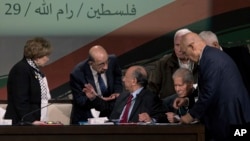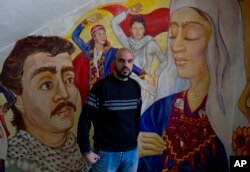The recent conference of the ruling Fatah party sent a disheartening message to young Palestinians: Most of those elected to top positions were in their 60s and 70s, signaling that politics under octogenarian President Mahmoud Abbas is an old man's game and that it is unlikely that fresh ideas on winning statehood will emerge from this group of veteran loyalists.
Apathy seems widespread among educated Palestinians in their 20s and 30s. Many have given up on trying to break into what they see a closed political system, especially at a time when there's no realistic path to ending Israel's half-century-old occupation.
Others are left to choose between potentially career-killing involvement in grassroots opposition movements that could even land them in jail or a years-long slog through the ranks of Fatah.
Abbas an unchallenged leader
The Fatah conference, which ended last weekend, crowned Abbas the unchallenged leader, boosting his ability to deal with the West and Arab states, said pollster Nader Said. For Palestinians, though, it meant prolonging a situation that “most people see as ineffective, unable to bring about a political solution, and corrupt to a large extent,” he said.
Abbas has led the Palestinians since 2005, but has little to show for his efforts.
An intense round of peace talks with former Israeli Prime Minister Ehud Olmert failed to yield an agreement, and brief negotiations with Prime Minister Benjamin Netanyahu over the past eight years quickly fizzled due to deep disagreements.
The stagnation comes at a time of mounting Palestinian fears that the incoming U.S. administration of Donald Trump might embrace or at least tolerate Israeli settlement construction on occupied lands sought for a Palestinian state.
Previous U.S. presidents, while unable to stop or significantly slow settlement expansion, routinely branded it an obstacle to a Middle East peace deal.
Younger leadership needed?
Fatah's aging leaders, including some still averse to dealing with computers and social media, may not be equipped to deal with change, said Palestinian analyst Jihad Harb.
“The Palestinian leadership lacks initiative and creativity,” he said. “If we had a younger, well-educated leadership, we would have seen more effectiveness in handling political issues. We would have seen more influence on U.S. decision makers, institutions and lobbies.”
Hasan Faraj, head of the Fatah youth wing Shabibeh, lobbied hard before the party convention to ease minimum age requirements for candidates for the decision-making Central Committee and a second-tier group, the Revolutionary Council.
Minimum age lowered
Under the old rules, only those older than 48 could run for the Central Committee and only those over 38 were eligible for the lower body.
Faraj, 36, succeeded in getting the minimum age lowered by 10 and five years, respectively, enabling him and others to compete. As a result, he and another activist of the same age are now the two youngest members of the Revolutionary Council, which has no actual power, but is seen as a stepping stone to positions of influence.
He acknowledged that it's a modest achievement.
His contemporaries in Fatah "don't see us as huge leaders, but they see us as a window of hope ... that this is the beginning of change," he said Tuesday at Shabibeh headquarters, decorated with photos of Fatah's 1960s founding fathers, Yasser Arafat and Khalil al-Wazir.
Fatah has lost ground
Dalal Salameh, 50, the second youngest member in the Central Committee and the only woman, said the election reflects the prevailing norms of patriarchy in Palestinian society and that it's up to the young to push for change.
"I see the system responding, but slowly, slowly," she said.
Fatah once dominated the Palestinian national movement, but has lost ground over the years to the Islamic militant group Hamas. The group has run the Gaza Strip, another territory meant to be part of a future Palestine, since seizing the area from Fatah-led forces nearly a decade ago. A subsequent crackdown by Abbas has forced Hamas underground in the West Bank.
For some, Fatah has become a lost cause, an impression reinforced during the recent party conference, which brought together more than 1,300 delegates at Abbas' government compound in the town of Ramallah.
"Normalization" rejected
Community organizer Hazem Abu Helal, 33, said he lost interest in the convention after he saw the 81-year-old Abbas re-elected Fatah leader by acclamation.
“When we see our leaders speaking for hours about the rights of youth, we start laughing [because] youth in Palestine starts from age 66,” Abu Helal said sarcastically. “These people don't accept a new generation. They don't accept change because they have power, they have money and they have corruption.”
Abu Helal is active in various grassroots opposition groups, which he said number hundreds of members who reject “normalization” of relations with Israel as long as the occupation continues. Israel captured the West Bank, Gaza and east Jerusalem in the 1967 Mideast war and has said it would negotiate the return of some, but not all of the occupied land.
Activist turns to teaching
Abu Helal has had to pay a price for his activism, including brief detentions after street protests, such as one against a resumption of U.S.-led Israeli-Palestinian negotiations. Despite years of failure, Abbas says he remains committed to seeking independence through a negotiated peace deal.
Some former activists said they have given up on political engagement.
Hala Shuaibi said she used to march in support of the 2011 Arab Spring uprisings, calling for political reform at home, but now seeks change through teaching. Shuaibi, 30, a university law lecturer, said that the political system is “not open for young people to participate and create change.”





